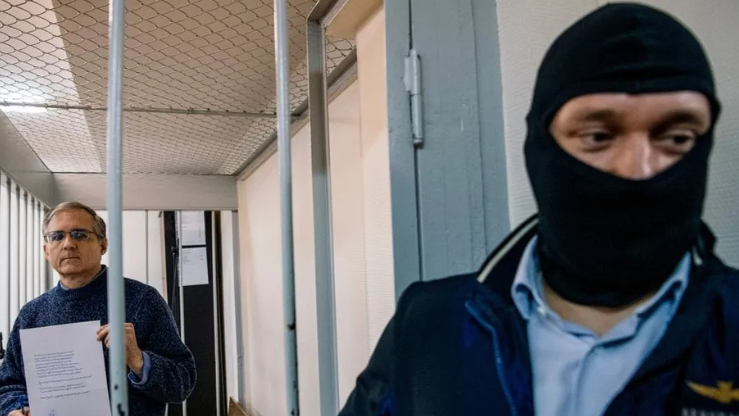Paul Whelan must have doubted this moment would come.
It has been 2,043 days since Federal Security Service (FSB) agents, wearing balaclavas, burst into his Moscow hotel room, pinned him to the floor and announced that he was being arrested for espionage.
I followed Mr. Whelan’s case in Moscow closely from the beginning and remember the day he arrived in court looking more like a dazed librarian than a cowardly intelligence agent.
His hands were handcuffed and he was holding a cardboard box containing his prison lunch.
He was too nervous to say much at first, and I found out later that he was being interrogated and threatened.
As time passed, Mr Whelan found his voice and began to loudly denounce his arrest.
Russia thinks it has got James Bond, that’s what he said one day, but in fact it made Mr. Bean go on vacation.
After he was sentenced to 16 years, we spoke at length on the phone from prison – Mr Whelan always insisted on his innocence.
Born in Canada to British parents with Irish roots, he is a citizen of four countries – which made his arrest a major diplomatic problem.
Long before any trial, Russia’s foreign minister alleged that Whelan was caught red-handed committing espionage.
The court later heard that he was trying to obtain secret information from a friend – in fact, an FSB intelligence agent.
But no evidence was made public.
Whelan, a former US Marine, was a fan of Russia and visited several times.
When he was arrested, he was in Moscow for the wedding of an American friend to a Russian woman and spent the morning leading guests around the Kremlin, including local residents.
After his arrest, I scoured his social media accounts looking for contacts or leads.
Some people were too nervous to speak, given the seriousness of the accusation.
But everyone who agreed to speak laughed at the idea that their friend might be involved in espionage.
“If he is a spy,” one of them wrote to me, with several exclamation points, “then I am Michael Jackson.”
For a long time, Whelan remained tirelessly optimistic about his fate.
He was convinced that the US government would get him out, even as relations between Russia and the West went from terrible to much worse.
Conditions in his prison camp, IK 17, were difficult, packed with “rapists and child killers,” as he once put it.
He studied Russian – even Tajik – wrote letters, read spy novels.
The rest of the time was spent sewing clothes in a prison workshop and the nights were regularly interrupted by the guards.
They would shine a torch in his face to check that he had not escaped.
Despite all this, Mr Whelan told me he had made a habit of singing his four national anthems out loud every morning – to annoy the guards and to keep his spirits up.
He called himself a political hostage and told me repeatedly that the FSB agents who took him – even the judge who sentenced him – assured him he would be exchanged.
That’s why he didn’t bother to appeal the sentence.

But as time passed, so did two other prisoner exchanges between Russia and the US, and both times Whelan was left out.
So when we spoke late last year, he admitted he felt abandoned by his government.
Officially designated as “unjustly detained”, he was assured he was a priority, Mr Whelan told me.
So he was “left in the dust.”
That day, on the phone, he was discouraged and frustrated like I had never heard him say before.
Aware that talks were underway to free Evan Gershkovich – the American journalist accused of espionage – he feared he had been left behind again.
Mr Whelan’s parents were getting old, his beloved dog Flora had died, he reminded me.
He felt like his life was disappearing.
Earlier this week, when rumors of a prisoner swap began to surface, I called Mr. Whelan’s former lawyer, Olga Karlova.
She had seen the reports and told me that she had written to IK 17 asking if Mr Whelan was there.
There was no response.
It was an important sign that a switch was happening, probably a major switch, although nothing was confirmed until everything was safely underway and could not be derailed.
Two days later, I have seen photos of Mr Whelan boarding a plane – no handcuffs, no prison uniform.
He looks a little dazed, probably exhausted.
But five years after landing in Moscow for a wedding reception, he is finally returning home.




































